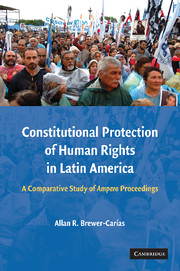 Constitutional Protection of Human Rights in Latin America
Constitutional Protection of Human Rights in Latin America Book contents
- Frontmatter
- Contents
- INTRODUCTION
- PART ONE THE CONSTITUTIONAL AND INTERNATIONAL DECLARATION OF HUMAN RIGHTS AND ITS JUDICIAL GUARANTIES
- PART TWO THE AMPARO AS A LATIN AMERICAN CONSTITUTIONAL AND INTERNATIONAL LAW INSTITUTION
- PART THREE THE INJURED PARTY AND THE CONSTITUTIONAL RIGHTS PROTECTED BY MEANS OF THE AMPARO PROCEEDING
- PART FOUR THE INJURY, THE INJURING PARTY AND THE INJURING ACTS OR OMISSIONS IN THE AMPARO PROCEEDING
- PART FIVE THE EXTRAORDINARY CHARACTER OF THE AMPARO PROCEEDING
- CONCLUSION
- APPENDIX A List of Latin American Constitutions
- APPENDIX B List of Latin American Amparo Laws (Statutes)
- INDEX
PART ONE - THE CONSTITUTIONAL AND INTERNATIONAL DECLARATION OF HUMAN RIGHTS AND ITS JUDICIAL GUARANTIES
Published online by Cambridge University Press: 08 August 2009
- Frontmatter
- Contents
- INTRODUCTION
- PART ONE THE CONSTITUTIONAL AND INTERNATIONAL DECLARATION OF HUMAN RIGHTS AND ITS JUDICIAL GUARANTIES
- PART TWO THE AMPARO AS A LATIN AMERICAN CONSTITUTIONAL AND INTERNATIONAL LAW INSTITUTION
- PART THREE THE INJURED PARTY AND THE CONSTITUTIONAL RIGHTS PROTECTED BY MEANS OF THE AMPARO PROCEEDING
- PART FOUR THE INJURY, THE INJURING PARTY AND THE INJURING ACTS OR OMISSIONS IN THE AMPARO PROCEEDING
- PART FIVE THE EXTRAORDINARY CHARACTER OF THE AMPARO PROCEEDING
- CONCLUSION
- APPENDIX A List of Latin American Constitutions
- APPENDIX B List of Latin American Amparo Laws (Statutes)
- INDEX
Summary
Among the rights attributed to a person, there are those declared or recognized in the constitutions, as “constitutional rights,” and among them there are the “human rights,” referred to those attributed only to human beings. Within the latter it is also possible to distinguish the civil rights or civil liberties, that is, the individual rights of personal liberty or freedom guaranteed in the Constitution, such as freedom of speech, press, assembly, movement or religion. However, “civil rights” do not exhaust the list of constitutional rights, nor of human rights, which today also comprises social, economic, cultural and environmental rights. “Civil rights” were those first declared in the constitutions, what is called the first generation of rights, but at present time they are accompanied by a long list of other rights belonging to what has been called second and third “generations” of rights.
Another expression that must be kept in mind and mainly used in Europe, particularly in Germany and Spain, is that of “fundamental rights,” used for the purpose of identifying certain constitutional rights that can be protected by a special judicial mean for protection also called amparo in Spain, which in general terms is equivalent to individual or civil rights. This expression of “fundamental rights” is also used in the Colombian Constitution (Articles 11-41), to identify a category of constitutional rights, mainly individual rights, which are of immediate application and can be protected by the acción de tutela (Article 86).
- Type
- Chapter
- Information
- Constitutional Protection of Human Rights in Latin AmericaA Comparative Study of Amparo Proceedings, pp. 11 - 12Publisher: Cambridge University PressPrint publication year: 2008


